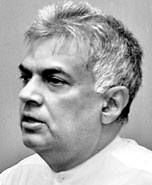NEW DELHI: The three-decade-long Sri Lankan conflict has not only bled the country’s economy but also failed to heal the divisions among its communities, Opposition Leader Ranil Wickremesinghe, now visiting New Delhi, said in an interview to the New Delhi based Asian Age newspaper.
Colombo’s triumph in "conventional warfare" over the Tigers has, however, caused its armed forces heavy casualties. When asked about casualties in the Army, a closely-guarded secret in that country, Mr Wickremesinghe said: "It is very high... The government does not want to announce it (death toll and injuries) thinking that this will demoralise the Army, but I don’t think so... The armed forces know what the casualties are."
It is learnt that "The bodybags are on the rise. The government does not want to reveal the figures... but I think it is an indication of the enormous sacrifices being made by soldiers in this operation."
He went on to add that the "sacrifices made by the armed forces should come out into the open... only then will people realise their contribution," and added: "This information is not coming out as the government is interested only in safeguarding its own interest."
Mr. Wickremesinghe said despite the military establishing its superiority in conventional warfare, its battle with the LTTE in the Mullaitivu jungles could drag on for long. The LTTE, he added, had "opted out of conventional warfare, realising that they cannot win".
Mr. Wickremesinghe said the Tigers had retreated deep into the Mullaitivu jungles and felt it could continue with its guerrilla campaign "as long as it has the support of the local population". He added: "The government has to take a political decision to win over the people, and eliminate the LTTE’s support base."
He, however, maintained that the ongoing military offensive to consolidate government control over one territory "is not opposed by us. We stand for it." He said that in the 2005 presidential elections, the UNP had put forward a proposal that a "political solution was necessary to end the conflict". He recalled, "But the LTTE asked the Tamils not to vote in the elections and therefore the solution we put on the table was rejected and we lost." Virtually indicating that the LTTE has brought the war on itself, Mr Wickremesinghe said: "Thereafter, dealing with the LTTE was the responsibility of the new President."
Meanwhile, despite the sustained offensive, LTTE chief Velupillai Prabhakaran is alive and hiding in the dense, impregnable Mullaitivu jungles. "Prabhakaran is alive and hiding in the Mullaitivu jungles.
Reports and information indicate that he is not leaving the country," Mr. Wickremesinghe revealed. He also maintained that most of the LTTE equipment has not been discovered yet.
"Some military officers feel that they are concealed and there could be some difficulty to locate them, though they have found a submarine and other light arms." He said the Army was "considering how it could fight inside the Mullaitivu jungles", adding, "There is, however, always an element of luck."
He admitted that there "was some kind of support to the LTTE by the people and till the government took any positive step to usher in confidence, people, albeit, "reluctantly, will provide support to the LTTE".
Asked whether a dead Prabhakaran could be a major cause of concern for the country, he replied: "If the social and economic issues are not settled, even if the whole of the LTTE disappears, there is room for another organisation to spring up." He pointed out that a "lot of support to the LTTE is coming from outside and that kind of infrastructure is still available". He described Prabhakaran as a "child of a problem and as long as the problem stays, there will be someone else to take up the issue".
As the battle rages with censored information, Mr Wickremesinghe maintained that the "priority was to evacuate the 200,000 civilians trapped in the LTTE-controlled area of the battle zone". He said this was a "humanitarian issue". Though he felt that with the "kind of military operation going on, this might sound difficult, but is not impossible".
He asserted that Sri Lanka has to rescue the trapped civilians to "fulfil obligations under international humanitarian law". He claimed that the LTTE has refused to allow people to cross over to the government-controlled areas and was being condemned for that. "But we cannot be judged by similar criteria. If the government does not take any step, it could lead to another major crisis," he said. |

